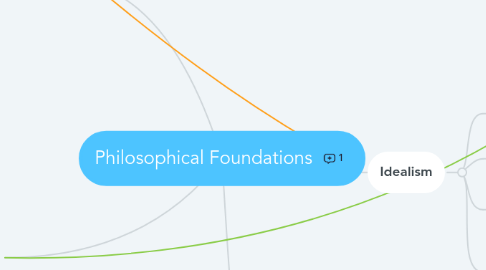
1. Conceptions of Curriculum
1.1. Social Reconstructionism
1.2. Academic Rationalism
1.3. Self Actualization
1.4. Cognitive
1.5. Technology
1.6. Humanistic
2. Realism
2.1. Truth is fixed
2.2. Knowledge, skills, content, and facts
2.3. Performance based
2.3.1. Quantifiable
2.4. Teacher's Role
2.4.1. Subject matter specialist
3. Reconstructionism
3.1. Premises
3.1.1. Society requires constant change
3.1.2. Societal change requires reconstructing education to apply to society
3.2. Teacher's role
3.2.1. Flexible
3.2.2. Concerned with student motivation
3.3. Action-based education
3.4. Individual development within a social context
3.5. Equal time inside and outside the classroom, allowing students to learn from the real world and apply theire learning
3.6. Extension of pragmatism
4. Curricular Design
4.1. Subject Centred Designs
4.1.1. Subject matter design
4.1.1.1. Logic is emphasized
4.1.1.2. Teachers are subject specialists
4.1.2. Discipline design
4.1.2.1. Understanding conceptual processes and structures of disciplines
4.1.3. Broad-field design
4.1.3.1. Integrates content that fits together logically
4.1.3.2. Widespread in K-12 curriculum
4.1.4. Correlation design
4.1.4.1. Doesn't want broad-field, but recognizes there are times when subjects require linkage
4.1.4.2. Overarching themes and cooperative planning
4.1.5. Process design
4.1.5.1. Critical thinking
4.1.5.2. Unravel process by which conclusions are reached
4.2. Problem Centred Designs
4.2.1. Reinforce cultural traditions
4.2.2. Based on social issues
4.3. Learner Centred Designs
4.3.1. Child-Centred
4.3.1.1. Active learning
4.3.1.2. Experience based
4.3.1.3. Teaching must suit child's developmental level
4.3.2. Experience-Centred
4.3.2.1. Experiences cannot be anticipated
4.3.2.1.1. Needs to be "on the spot"
4.3.3. Romantic (radical)
4.3.3.1. Students must learn to critique knowledge
4.3.3.2. Unpacking preconceptions
4.3.4. Humanistic
4.3.4.1. Holistic
4.3.4.2. Learning with emotion ,wonder, and imagination
5. Idealism
5.1. Aims
5.1.1. Character development
5.1.2. Self Actualization
5.2. Holistic
5.3. Teacher's Role
5.3.1. brings together world of the classroom and the world outside the classroom
5.3.2. represents ideal adult role model
5.4. Curriculum is a vehicle to develop thinking skills
6. Pragmatism
6.1. Education based on students experiences with the world
6.2. Social process
6.3. Teacher's role
6.3.1. Faciliate
6.3.2. Acknowledge students are at different levels and what motivates one may not motivate another
6.4. Individual growth is important
6.4.1. Psychological traits
6.4.2. Sociological traits
6.5. Learning by doing
6.5.1. Action based education

